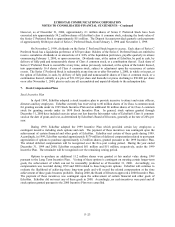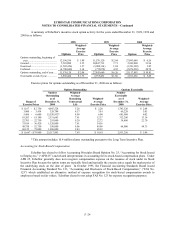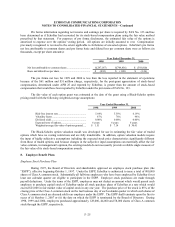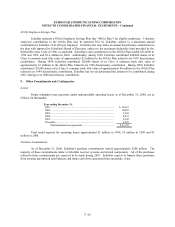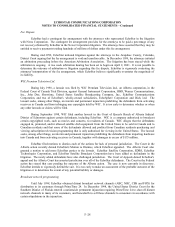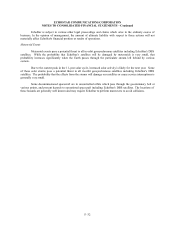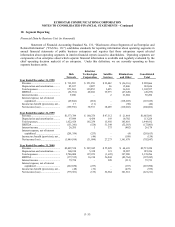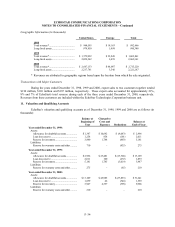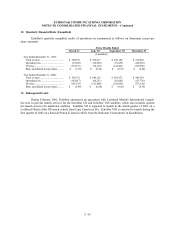Dish Network 2000 Annual Report Download - page 80
Download and view the complete annual report
Please find page 80 of the 2000 Dish Network annual report below. You can navigate through the pages in the report by either clicking on the pages listed below, or by using the keyword search tool below to find specific information within the annual report.ECHOSTAR COMMUNICATIONS CORPORATION
NOTES TO CONSOLIDATED FINANCIAL STATEMENTS – Continued
F–29
In October 1998, EchoStar filed a declaratory judgment action against ABC, NBC, CBS and FOX in
Denver Federal Court. EchoStar asked the court to enter a judgment declaring that its method of providing distant
network programming did not violate the Satellite Home Viewer Act and hence did not infringe the networks’
copyrights. In November 1998, the networks and their affiliate groups filed a complaint against EchoStar in Miami
Federal Court alleging, among other things, copyright infringement. The court combined the case that EchoStar
filed in Colorado with the case in Miami and transferred it to the Miami court. The case remains pending in Miami.
While the networks have not sought monetary damages, they have sought to recover attorney fees if they prevail.
In February 1999, the networks filed a “Motion for Temporary Restraining Order, Preliminary Injunction
and Contempt Finding” against DirecTV, Inc. in Miami related to the delivery of distant network channels to
DirecTV customers by satellite. DirecTV settled this lawsuit with the networks. Under the terms of the settlement
between DirecTV and the networks, some DirecTV customers were scheduled to lose access to their satellite-
provided distant network channels by July 31, 1999, while other DirecTV customers were to be disconnected by
December 31, 1999. Subsequently, PrimeTime 24 and substantially all providers of satellite-delivered network
programming other than EchoStar agreed to this cut-off schedule, although EchoStar does not know if they adhered
to this schedule.
In December 1998, the networks filed a Motion for Preliminary Injunction against EchoStar in the Miami
court, and asked the court to enjoin EchoStar from providing network programming except under limited
circumstances. A preliminary injunction hearing was held on September 21, 1999. The court took the issues under
advisement to consider the networks’ request for an injunction, whether to hear live testimony before ruling upon
the request, and whether to hear argument on why the Satellite Home Viewer Act may be unconstitutional, among
other things.
In March 2000, the networks filed an emergency motion again asking the court to issue an injunction
requiring EchoStar to turn off network programming to certain of its customers. At that time, the networks also
argued that EchoStar’s compliance procedures violate the Satellite Home Viewer Improvement Act. EchoStar
opposed the networks’ motion and again asked the court to hear live testimony before ruling upon the networks’
injunction request.
During September 2000, the Court granted the Networks’ motion for preliminary injunction, denied the
Network’s emergency motion and denied EchoStar’s request to present live testimony and evidence. The Court’s
original order required EchoStar to terminate network programming to certain subscribers “no later than February
15, 1999,” and contained other dates which would be physically impossible to comply with. The order imposes
restrictions on EchoStar’s past and future sale of distant ABC, NBC, CBS and Fox channels similar to those
imposed on PrimeTime 24 (and, EchoStar believes, on DirecTV and others). Some of those restrictions go beyond
the statutory requirements imposed by the Satellite Home Viewer Act and the Satellite Home Viewer Improvement
Act. For these and other reasons EchoStar believes the Court’s order is, among other things, fundamentally flawed,
unconstitutional and should be overturned. However, it is very unusual for a Court of Appeals to overturn a lower
court’s order and there can be no assurance whatsoever that it will be overturned.
On October 3, 2000, and again on October 25, 2000, the Court amended its original preliminary injunction
order in an effort to fix some of the errors in the original order. The twice amended preliminary injunction order
required EchoStar to shut off, by February 15, 2001, all subscribers who are ineligible to receive distant network
programming under the court’s order. EchoStar has appealed the September 2000 preliminary injunction order and
the October 3, 2000 amended preliminary injunction order. On November 22, 2000, the United States Court of
Appeals for the Eleventh Circuit stayed the Florida Court’s preliminary injunction order pending EchoStar’s appeal.
At that time, the Eleventh Circuit also expedited its consideration of EchoStar’s appeal.






